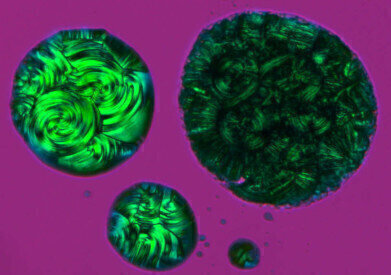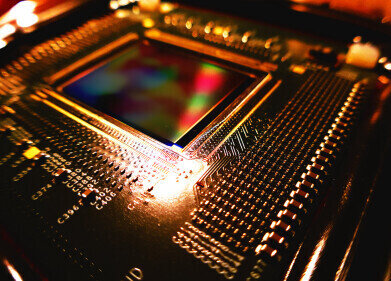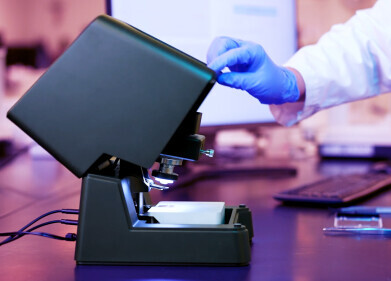Microscopy & Microtechniques
Heating Stage used to Study Liquid Crystals at the University of the Orange Free State
May 16 2013
Researchers in the physical chemistry department of the University of the Orange Free State (UFS) have examined the discotic liquid crystal properties of a number of long chain metal free and zinc phthalocyanines using the Linkam THMS600 hot stage.
The samples were studied using the THMS600 stage in conjunction with an Olympus BH-2 polarising microscope. The scientists were able to determine the existence of the different phases by comparing the observed texture with data from previous X-ray studies. As many as three mesophases were detected within the non-metal and zinc derivative compounds as they were heated. The scientists found changes in observable textures were a function of the heating/cooling rates used; for example when the C15 metal free derivative was cooled at 10°C min-1 the result was a needle like texture while slow cooling at 2°C min-1 resulted in a fan-like texture.
Dr Eleanor Fourie, a lecturer in the department, commented that they had been using the system for over seven years for "a variety of applications including organometallic synthesis and associated studies. The microscope and Linkam hot stage are used to test the liquid crystal properties of some phthalocyanines. It is also used for basic melting point determinations." These compounds were of specific interest as some phthalocyanines within their mesophase have shown rapid response and recovery time to gas exposure and the zinc phthalocyanines in particular have demonstrated beneficial properties for cancer photodynamic therapy.
The properties of each compound are dependent on chain-length and metal constituent, and with the large number of variants to study, the research on synthesis, properties and industrial applications is an ongoing project. As they are understood better, these highly useful chemicals become relevant to old, new and cutting edge scientific applications.
The THMS600 has a wide temperature range of -196°C to 600°C and samples can be quickly characterised by heating to within a few degrees of the required temperature at a rate of up to 150°C min-1 with no overshoot, then slowed down to a few tenths of a degree per minute to examine sample changes closely.
Digital Edition
ILM 49.5 July
July 2024
Chromatography Articles - Understanding PFAS: Analysis and Implications Mass Spectrometry & Spectroscopy Articles - MS detection of Alzheimer’s blood-based biomarkers LIMS - Essent...
View all digital editions
Events
Jul 28 2024 San Diego, CA USA
Jul 30 2024 Jakarta, Indonesia
Jul 31 2024 Chengdu, China
ACS National Meeting - Fall 2024
Aug 18 2024 Denver, CO, USA
Aug 25 2024 Copenhagen, Denmark




24_06.jpg)













